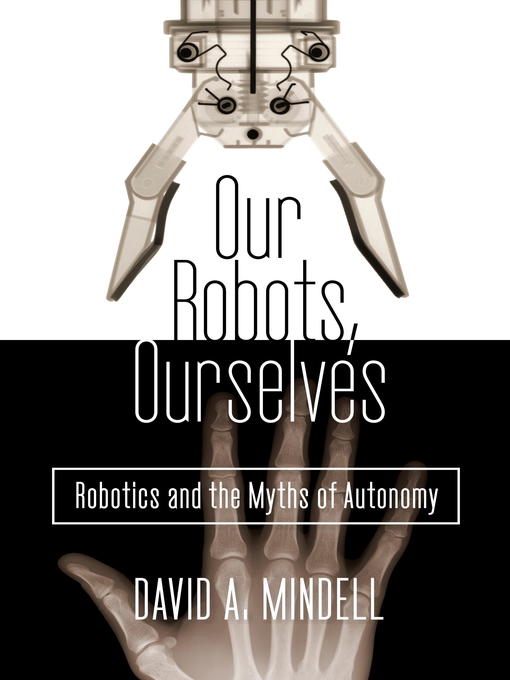
Our Robots, Ourselves
Robotics and the Myths of Autonomy
کتاب های مرتبط
- اطلاعات
- نقد و بررسی
- دیدگاه کاربران
نقد و بررسی

August 3, 2015
No robot takeover is in the offing, but this savvy insider’s account of automated systems argues that we can expect ever more intimate cooperation of humans with intelligent machines. MIT engineering professor and historian Mindell (Digital Apollo) surveys robotic systems in extreme environments: submersibles that dive to ocean depths too dangerous for humans; aviation systems that can fly a plane—or crash it; Predator drones whose crews find their experience of combat at a remove to be immersive and harrowing; Mars rovers that feel like bodily extensions of geologists at mission control. Mindell, who works on automation systems, offers an engaging history of their capabilities and short-comings that’s full of intriguing technical detail but very accessible to laypeople. He also delves into the sociology of automation—how people learn to work with robots and change their conception of their own work and social identity. His hopeful conclusion, exemplified by NASA’s repair missions to the Hubble space telescope, is that robots work best in close communication with people, giving humans a sense of presence in and mastery of tasks they can’t perform unaided. Mindell’s is one of the best-informed and most thoughtful analyses of automation, and a corrective to the ominous hype surrounding the issue. Photos. Agent: Katherine Flynn, Kneerim, William & Bloom.

August 15, 2015
Historian and engineer Mindell (History of Engineering and Manufacturing, Aeronautics and Astronautics/MIT; Digital Apollo: Human and Machine in Spaceflight, 2008, etc.) argues that it's time to change how we think about robots. For decades, robots have been used in "extreme" environments, from deep oceans to outer space. Drawing on research, interviews, and extensive experience in undersea robotic exploration and the engineering of autonomous aircraft, the author takes us deep inside these robotic applications to reveal the critical role that humans will continue to play in the emerging world of driverless cars, robotic surgery, and remote warfare. His authoritative account looks at the relationship between humans and machines as they explore underwater environments for shipwrecks, conduct remote battles through drones, and engage in distant exploration and repair missions in outer space. In each instance, scientists and others do not physically go to sites where they are working, but their "minds and imaginations" spend days there. Space scientists "become" the distant rover. ("It's...some kind of weird, man-machine bond," says one.) Predator pilots, based in air-conditioned control rooms, experience identity crises as they engage in distant warfare "mediated by technology." Geologists, accustomed to working directly with materials, often feel threatened professionally when engaged in remote undersea exploration. Yet humans are not abdicating to robots, writes Mindell. They are adjusting to new roles and using the robots. Indeed, the human factor-"human decisions, presence, and expertise"-remains more crucial than ever in working with robots. General readers will wish the author had offered more examples of the unusual man-machine interactions in the words of people who experienced them, but Mindell certainly dispels any notion that these robots are completely autonomous and leaves us with a better understanding of what lies ahead for our daily lives. A lucid counterbalance to the menacing view of robotics long depicted in science fiction.
COPYRIGHT(2015) Kirkus Reviews, ALL RIGHTS RESERVED.

Starred review from September 1, 2015
Mindell (Frances & David Dibner Professor of the History of Engineering Manufacturing; aeronautics & astronautics, MIT; War, Technology and Experience Aboard the USS Monitor) provides an accessible treatment of the debate of autonomous and human-controlled machinery. The author draws on ethnographic research of several automated industries and his professional experience developing remote vehicles used in scientific exploration of extreme undersea environments. The book explores the culture of the automation vs. human debate and offers readers a well-reasoned alternative to the current binary narrative. Human-assisted machinery and hybrid automation need not replace or supplant humans, says Mindell, but should rather assist while human skills remain the main driver of machinery. This narrative is unpacked in chapters that focus on extreme environments that utilize automated machinery in some way. VERDICT An expansively researched and enjoyably accessible treatment of robotic automation, recommended for readers of popular science and those with an interest in artificial intelligence and automation.--Jim Hahn, Univ. Lib., Univ. of Illinois, Urbana
Copyright 2015 Library Journal, LLC Used with permission.

September 1, 2015
MIT professor Mindell explores the increasingly prevalent notion that, someday, robots will replace human beings. Don't panic, he says; while advancing technologies will change the roles humans will play in some fields of endeavor, we aren't doomed to becoming superfluous. There are, for example, robotic deep-sea and extraplanetary exploratory vehicles that can move about all by themselves, but people are still needed to interpret the data the vehicles collect. The notion that people will be replaced by machines, drawn largely from novels, movies, and TV shows, is not so much paranoid as simply naive. Humans and machines, Mindell believes, will work together, with people using technology to expand their reach, but there are potential downsides to the pairing of human and hardware. Because computerized controls distance us from the direct nature of tasks, there's a real danger that we could come to rely on our machines so much that we forget how to operate without them, the way pilots have been shown to be unable to manually pilot an aircraft whose computer-controlled systems are inoperable. A careful, measured extrapolation of contemporary technological trends.(Reprinted with permission of Booklist, copyright 2015, American Library Association.)

























دیدگاه کاربران